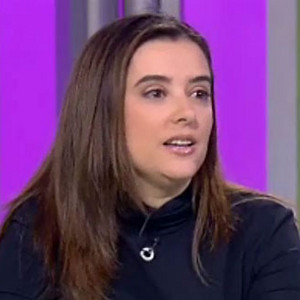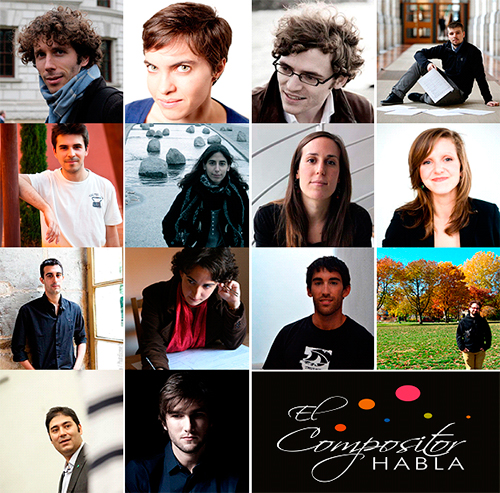Artistas
Bruce Broughton (Compositor)
Bruce Broughton | Tengo un motor interno que necesita salir
19/07/2015Una entrevista de Ruth Prieto para El Compositor Habla
Es un grandísimo compositor, de raza, de esos que da igual si es una banda sonora, un concierto, un videojuego o una obra de cámara, en cualquier escenario saca lo mejor de cada situación y sale el talento, la creatividad, la experiencia, el oficio.
Ha trabajado con algunos de los más importantes directores como Lawrence Kasdan, Barry Levinson y ha recibido más de 20 nominaciones a los premios Emmy, todo un record con 10 estatuillas conseguidas.
Su carrera no solo se ciñe al cine, televisión y medios audiovisuales, ha escrito solos, música de cámara y varias obras orquestales.
Compositor, director, profesor y miembro de varias e importantes asociaciones Brougton es un hombre que se define reservado, obsesionado con ‘las fechas de entrega’. No le gustan las etiquetas, el compone solo para que los músicos disfruten tocando su música y el público disfrute escuchándola. No es persona de grandes manía pero si enormemente perfeccionista.
Ruth Prieto, para El Compositor Habla, entrevista al compositor americano Bruce Broughton
Los Ángeles, Julio 2015
Bruce Broughton: Reserved. Slow to react. I like to mull over ideas.
2. R.P.: What are you working on now?
Bruce Broughton: I´m just beginning a string quartet for the Lyris Quartet, who will be recording it later this year.
3. R.P.: What is your main obsession when working?
Bruce Broughton: Finishing on time, if I´m on a deadline. The second obsession is to hope that the music is good.
4. R.P.: Can you define «contemporary»?, and in which way Bruce Broughton is «contemporary»?
Bruce Broughton: I think you mean the word as in “contemporary music.” The word when used with music usually refers to things like “extended techniques” on instruments – playing them in unusual ways to produce unique sounds, or experimenting with new forms or creating new sonorities or, as Gunther Schuller once said to me, to “write music that no one´s heard yet.” I am probably more “contemporary” in that sense when I´m working on a film score, because these techniques often are good for producing striking dramatic effects. But when I´m writing my own music, I try to simply write what I want to hear and what I want to produce.
Bruce Broughton: I suppose I have an internal engine that needs to get out. Although my personality is rather reserved, my interior life is not, and music is a good way to get some of it expressed.
6. R.P.: What are your musical roots (real or imaginary)?
Bruce Broughton: My musical roots are basically in European and American folksong, hymnology, music hall ditties, cowboy tunes and a very great mass of 19th century romantic music.
7. R.P.: Have you got any eccentricities when composing?
Bruce Broughton: I don´t think so. I most often begin composing at the piano, although sometimes I begin away from the piano or on the computer. Eventually I put what I´ve composed into a notation program and then keep working on it until everything seems to make sense. Afterwards – perhaps weeks or months, I´ll look at it again, and wonder why I wrote it the way I did. Years later, I´ll hear it and often think it´s pretty good; but while the music is still fresh in my mind, I hear too many possibilities to settle with what I wrote. However, I always stop writing when I think I can´t do it any better, and then I wonder why it isn´t better than it is, or what I would have had to do in order to be able to do it better, just the same.
9. R.P.: What was most recent moment of pleasure that you got from music? ¿And the most recent unpleasant surprise?
Bruce Broughton: My biggest pleasure is finding out that the music is better than I thought it was after I´ve heard the first performance. Recently, my cello concerto was premiered, and I was greatly relieved that I actually liked it. And of course it was a good performance. The most recent unpleasant surprise is a performance by people who were either not prepared or not competent to play the music. It doesn´t happen often, but I get unpleasant surprises from time to time. They´re often corrected, however, by a better performance later.
10.R.P.: What is composition for you in this day and age?
Bruce Broughton: Composition seems to be a way I can get some of my interior life out, a way I can express myself nonverbally. It´s also a lot of problem solving, something I enjoy doing; the problem – or challenge – often is: can I write a really good piece this next time? Can I do something I´ve never done, something that´s outside my comfort zone? Sometimes, it´s just the joy in trying out new combinations. I recently wrote a piece for 16 French horns which I haven´t heard yet. I´m looking forward to seeing how close I came to solving the problems involved with something like that, and finding out whether an audience will just take it all in on the first performance.
11. R.P.: If you had not been a composer, what would you like to have been?
Bruce Broughton: My first ambition was to become an animator, but I think it´s a good thing I didn´t do that. I´ve worked with some good animators and I don´t think I ever had as much talent as they do. I think a good second choice for a career probably would have been a psychologist.
Bruce Broughton: I can´t really say, but whatever it was it must have been good, because I don´t regret it.
13. R.P.: What does music contribute to education?
Bruce Broughton: Music is for the soul. Stravinsky thought that music connected man to God. It certainly connects man to man. It doesn´t kill or threaten anyone and it has limitless scope and possibilities. It´s fun to do. It´s creative. It has a very high ceiling. It´s all about the best parts of people. It´s very personal in an extremely metabolic way. It helps put what´s important into perspective. All of this is important in education.
14. R.P.: Who would you rescue from the past?
Bruce Broughton: People like Stephen Foster, Georges Bizet, Van Gogh – artists who never lived long enough to know how great their work was.
15. R.P.: What´s interesting about the present?
Bruce Broughton: I´m still in it; there is nothing determined; the possibilities are endless; I always have choices; life is much better than the alternative.
16. R.P.: What do you expect from the future?
Bruce Broughton: More life. I plan to keep working and enjoying my life until I drop.
17. R.P.: What would be your advice to a young composer?
Bruce Broughton: Write a lot of music. You need the practice. Listen to a lot of music. You need some scope. Learn traditional music along with contemporary techniques. It´s called “craft.” Learn to write melodies – good melodies; they´ll last longer than anything else you´ll write. Study composers who are really good. Don´t waste your time with musical slop. Learn counterpoint and orchestration. It´s called “technique.” Make a point to listen to the music you think you don´t like. Music is not poison; it can´t kill you. You´ll definitely learn something. Learn to write in different styles. Share what you know. Don´t write music for free. Writing music is real work and needs to be respected, especially by you.
18. R.P.: Recommend us a book
Bruce Broughton: “Symbols of Transformation” by Carl Jung.
19. R.P.: A "must" film
Bruce Broughton: “All Quiet on the Western Front”
20. R.P.: A song that puts right an off day
Bruce Broughton: “There Are Bad Times Just Around the Corner” by Noel Coward.
21. R.P.: What would you like to do in music that you have not been asked to do yet?
Bruce Broughton: A big symphonic work, maybe with choir. But not for a movie. Or maybe a really terrific chamber work. Whatever it is, something that´s really well written and emotionally effective.
22. R.P.: What would Bruce Broughton say about Bruce Broughton?
Bruce Broughton: He tries hard. He doesn´t know enough. He´s generous and disappointed when other people aren´t. He´s nuts about music and would like to contribute something good of his own. His family is very important to him. He´s happier than he´s ever been.
Bruce Broughton, July, 2015
La foto de del Maestro Broughton ha sido facilitada amablemente por el compositor
Ha trabajado con algunos de los más importantes directores como Lawrence Kasdan, Barry Levinson y ha recibido más de 20 nominaciones a los premios Emmy, todo un record con 10 estatuillas conseguidas.
Su carrera no solo se ciñe al cine, televisión y medios audiovisuales, ha escrito solos, música de cámara y varias obras orquestales.
Compositor, director, profesor y miembro de varias e importantes asociaciones Brougton es un hombre que se define reservado, obsesionado con ‘las fechas de entrega’. No le gustan las etiquetas, el compone solo para que los músicos disfruten tocando su música y el público disfrute escuchándola. No es persona de grandes manía pero si enormemente perfeccionista.
Ruth Prieto, para El Compositor Habla, entrevista al compositor americano Bruce Broughton
Los Ángeles, Julio 2015
"Music is for the soul. Stravinsky thought that music connected man to God. It certainly connects man to man. It doesn´t kill or threaten anyone and it has limitless scope and possibilities. It´s fun to do. It´s creative. It has a very high ceiling. It´s all about the best parts of people. It´s very personal in an extremely metabolic way. It helps put what´s important into perspective. All of this is important in education."
.jpg)
1. Ruth Prieto: Which characteristic defines you best?
Bruce Broughton: Reserved. Slow to react. I like to mull over ideas.
2. R.P.: What are you working on now?
Bruce Broughton: I´m just beginning a string quartet for the Lyris Quartet, who will be recording it later this year.
3. R.P.: What is your main obsession when working?
Bruce Broughton: Finishing on time, if I´m on a deadline. The second obsession is to hope that the music is good.
4. R.P.: Can you define «contemporary»?, and in which way Bruce Broughton is «contemporary»?
Bruce Broughton: I think you mean the word as in “contemporary music.” The word when used with music usually refers to things like “extended techniques” on instruments – playing them in unusual ways to produce unique sounds, or experimenting with new forms or creating new sonorities or, as Gunther Schuller once said to me, to “write music that no one´s heard yet.” I am probably more “contemporary” in that sense when I´m working on a film score, because these techniques often are good for producing striking dramatic effects. But when I´m writing my own music, I try to simply write what I want to hear and what I want to produce.
"I don´t worry too much whether I will be considered “contemporary” or not, only whether anyone enjoys playing or hearing the music."
5. R.P.: What inspires you as a composer and why?Bruce Broughton: I suppose I have an internal engine that needs to get out. Although my personality is rather reserved, my interior life is not, and music is a good way to get some of it expressed.
6. R.P.: What are your musical roots (real or imaginary)?
Bruce Broughton: My musical roots are basically in European and American folksong, hymnology, music hall ditties, cowboy tunes and a very great mass of 19th century romantic music.
7. R.P.: Have you got any eccentricities when composing?
Bruce Broughton: I don´t think so. I most often begin composing at the piano, although sometimes I begin away from the piano or on the computer. Eventually I put what I´ve composed into a notation program and then keep working on it until everything seems to make sense. Afterwards – perhaps weeks or months, I´ll look at it again, and wonder why I wrote it the way I did. Years later, I´ll hear it and often think it´s pretty good; but while the music is still fresh in my mind, I hear too many possibilities to settle with what I wrote. However, I always stop writing when I think I can´t do it any better, and then I wonder why it isn´t better than it is, or what I would have had to do in order to be able to do it better, just the same.
9. R.P.: What was most recent moment of pleasure that you got from music? ¿And the most recent unpleasant surprise?
Bruce Broughton: My biggest pleasure is finding out that the music is better than I thought it was after I´ve heard the first performance. Recently, my cello concerto was premiered, and I was greatly relieved that I actually liked it. And of course it was a good performance. The most recent unpleasant surprise is a performance by people who were either not prepared or not competent to play the music. It doesn´t happen often, but I get unpleasant surprises from time to time. They´re often corrected, however, by a better performance later.
10.R.P.: What is composition for you in this day and age?
Bruce Broughton: Composition seems to be a way I can get some of my interior life out, a way I can express myself nonverbally. It´s also a lot of problem solving, something I enjoy doing; the problem – or challenge – often is: can I write a really good piece this next time? Can I do something I´ve never done, something that´s outside my comfort zone? Sometimes, it´s just the joy in trying out new combinations. I recently wrote a piece for 16 French horns which I haven´t heard yet. I´m looking forward to seeing how close I came to solving the problems involved with something like that, and finding out whether an audience will just take it all in on the first performance.
11. R.P.: If you had not been a composer, what would you like to have been?
Bruce Broughton: My first ambition was to become an animator, but I think it´s a good thing I didn´t do that. I´ve worked with some good animators and I don´t think I ever had as much talent as they do. I think a good second choice for a career probably would have been a psychologist.
"I´m very interested in why people do anything, what the nature of meaning is to different individuals, what a person´s definition of reality is."
12. R.P.: What has your greatest extravagance been?Bruce Broughton: I can´t really say, but whatever it was it must have been good, because I don´t regret it.
13. R.P.: What does music contribute to education?
Bruce Broughton: Music is for the soul. Stravinsky thought that music connected man to God. It certainly connects man to man. It doesn´t kill or threaten anyone and it has limitless scope and possibilities. It´s fun to do. It´s creative. It has a very high ceiling. It´s all about the best parts of people. It´s very personal in an extremely metabolic way. It helps put what´s important into perspective. All of this is important in education.
14. R.P.: Who would you rescue from the past?
Bruce Broughton: People like Stephen Foster, Georges Bizet, Van Gogh – artists who never lived long enough to know how great their work was.
15. R.P.: What´s interesting about the present?
Bruce Broughton: I´m still in it; there is nothing determined; the possibilities are endless; I always have choices; life is much better than the alternative.
16. R.P.: What do you expect from the future?
Bruce Broughton: More life. I plan to keep working and enjoying my life until I drop.
17. R.P.: What would be your advice to a young composer?
Bruce Broughton: Write a lot of music. You need the practice. Listen to a lot of music. You need some scope. Learn traditional music along with contemporary techniques. It´s called “craft.” Learn to write melodies – good melodies; they´ll last longer than anything else you´ll write. Study composers who are really good. Don´t waste your time with musical slop. Learn counterpoint and orchestration. It´s called “technique.” Make a point to listen to the music you think you don´t like. Music is not poison; it can´t kill you. You´ll definitely learn something. Learn to write in different styles. Share what you know. Don´t write music for free. Writing music is real work and needs to be respected, especially by you.
18. R.P.: Recommend us a book
Bruce Broughton: “Symbols of Transformation” by Carl Jung.
19. R.P.: A "must" film
Bruce Broughton: “All Quiet on the Western Front”
20. R.P.: A song that puts right an off day
Bruce Broughton: “There Are Bad Times Just Around the Corner” by Noel Coward.
21. R.P.: What would you like to do in music that you have not been asked to do yet?
Bruce Broughton: A big symphonic work, maybe with choir. But not for a movie. Or maybe a really terrific chamber work. Whatever it is, something that´s really well written and emotionally effective.
22. R.P.: What would Bruce Broughton say about Bruce Broughton?
Bruce Broughton: He tries hard. He doesn´t know enough. He´s generous and disappointed when other people aren´t. He´s nuts about music and would like to contribute something good of his own. His family is very important to him. He´s happier than he´s ever been.
Bruce Broughton, July, 2015
La foto de del Maestro Broughton ha sido facilitada amablemente por el compositor
Destacamos ...
Nueva Sección Directorio
dedicada a la promoción de compositores, intérpretes, instituciones y editoriales.

dedicada a la promoción de compositores, intérpretes, instituciones y editoriales.



